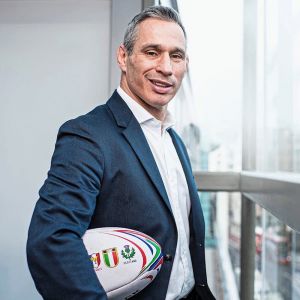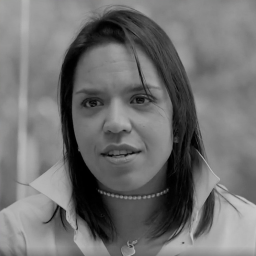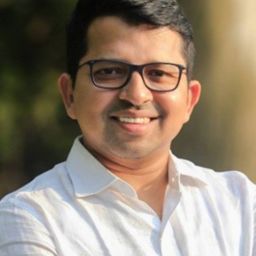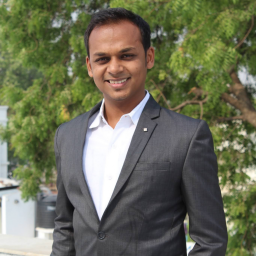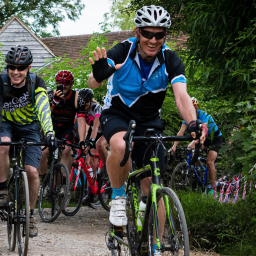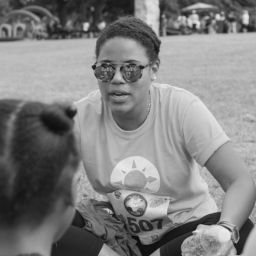Slum Soccer – a thinkBeyond client as part of the Sport for Good Response Fund – is an Indian charity using football to transcend race, religion, language, and gender, to bring about positive social change in the lives of street dwellers.
We spoke to Pankaj Mahajan, a Project Head at the charity, about his mental health journey, and how football gave him a solid foundation to rebuild his life and inspire others.
Meaningful Business (MB): Tell us a bit about who you are and how you became connected to Slum Soccer?
Pankaj Mahajan (PM): I am 26 years old and live in Godhani, a small village in Nagpur District Maharashtra, India. My upbringing was very difficult. I spent my childhood witnessing and being a victim of domestic violence perpetuated by my alcoholic father. I dropped out of education early and became trapped into addiction and wasteful activities.
One day, I was crying outside my home, feeling so helpless after my mother was brutally beaten by my father. It was then that one of the Slum Soccer coaches helped me, inviting me to a football session the next day. Football was a strange game for me – I had never seen or played it before! But things began to change for the better. Football’s healing touch helped me to mend my psyche and utilise my energy productively.
MB: How has Slum Soccer positively changed your life?
PM: Within a short time of joining Slum Soccer in 2010, I was encouraged to continue my education, which has had a hugely positive impact. As my passion for the game grew, I was able to give up addiction and lead a disciplined and healthy life. Slum Soccer provided a positive environment for me to improve my communication skills, helping me to learn English and develop my creative writing skills.
I also was selected to represent my district and state in the National Inclusion Cup in 2012 in Bangalore and then at the 2013 Homeless World Cup in Poznan, Poland. These experiences gave me the opportunity to interact with youth from other countries and sparked a passion for coaching and furthering my education. When I returned to India, I immediately dedicated myself to transforming the lives of those who had strayed off from the right path, just like the Slum Soccer coaches had done for me.
I owe my transformation, from not having any path in life to becoming a socially productive and responsible human being, to Slum Soccer. They helped me find meaning, as well as turn over a new leaf and start leading the life I wanted for myself and others. More importantly, I am now contributing towards making a meaningful difference in the lives of those less fortunate.
MB: What is your role in Slum Soccer?
PM: I am the Project Head of the Shakti Girls and coordinator of DeafKidzGoal Projects. The Shakti Girls Project educates and empowers underprivileged girls living in slum communities. In most cases, their families are highly conservative, misogynistic and have a strong patriarchal mindset. The DeafKidzGoal Project provides sports and basic life skills training to deaf children, spreading deaf awareness and promoting inclusion. As well as leading these two projects, I mentor and coach young people.
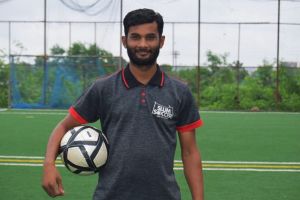 Pankaj Mahajan, Project Head, Slum Soccer (Image Credit: Slum Soccer)
Pankaj Mahajan, Project Head, Slum Soccer (Image Credit: Slum Soccer)
MB: How have these experiences changed your mental health and wellbeing?
PM: Mental health issues like anxiety, depression, stress, and suicidal thoughts were part of my childhood. When I was growing up, incidences like my mother being beaten regularly, discrimination and exclusion because of my bad habits in my community were devastating. It traumatised me and left me feeling alone. But sports – namely football – helped me to not only improve my physical health but also my mental health. My regular participation in football increased my self-esteem and reduced my stress and anxiety. It changed my routine constructively. Playing in the morning and teaching children in the evening, gave me a sense of belonging and hopefulness.
In the beginning when I started playing, I became a part of something bigger than myself. A good friendship circle, a learning atmosphere and good coaches impacted my life positively. They encouraged me to give up bad habits and wasteful activities and inspired me take up sports and engaging children in my society.
I believe that keeping oneself engaged is the best and the most powerful way to overcome trauma and depression. Sport gave me responsibility and motivated me in a way that I did not realise I was capable of. It helped me overcome my depression and trauma.
I now use my physical health and mental resilience to help other young people. During this Covid-19 crisis, we are designing online activities and keeping our participants and youth at Slum Soccer engaged and encouraged. Today, I help children and youth from my community overcome trauma, depression, and anxiety by introducing them to football.
MB: What mental health and wellbeing lessons have you learnt during your time with Slum Soccer?
PM: I have learnt that the foundations you build are an important part of your future development. By focusing on building basic life skills such as leadership, teamwork, communication and problem solving, you are then able to develop coping tools, like how to be more resilient and tackle setbacks positively.
This has helped me to understand that learning is a journey not a destination. Never stop learning, because life never stops teaching you. I am constantly seeking knowledge and improving my awareness of big issues like the environment, child rights, gender equality, inclusion and safeguarding.
MB: What does football mean to you?
PM: Football means different things to different people. It could simply be a game you enjoy, a place to escape, a way to keep physically and mentally fit, a source of camaraderie and spirit. However, to me, it means a way of life. This simple, yet glorious game has given me so much in such a short time. It has been responsible for saving me from falling into an abyss and has been a driving force for getting my life back on track.
It has been my friend, my teacher, my source of livelihood and has shaped my mental health to what it is today.
Where football’s magic resonates with me the most is that it is a game of, and for, the masses. It serves as a great leveller. It has been my spiritual guide, teaching me what to give up, like addiction and wasting my life through unproductive and socially detrimental activities. At the same time, it has taught me what to persevere with; my education, knowledge and learning skills that help me develop and progress.
MB: What mental wellbeing tips have you learnt?
I have personally learnt to not let problems overwhelm you. Invite others in to help you, as you cannot face mental health challenges alone. I try to be as positive as I can be and to dream impossible dreams. I never thought I would be where I am today when I was a teenager, but here I am now. I try to remain inquisitive and constantly learn, as my own health and wellbeing can change over time and having more tools under your belt is only a good thing.
MB: What advice are you providing to those you coach and mentor to stay mentally well during the pandemic?
PM: The importance of sports and physical exercise in helping people stay physically and mentally fit cannot be reiterated enough.
I have remained in constant touch with participants of my projects and have been advising them to adopt Covid-19 appropriate behaviour and safeguards. I continue to lead them through yoga and exercise sessions to ensure their pent-up energy finds an outlet and they do not fall prey to lockdown lethargy. During online sessions we also discuss the developments happening in and around them, as well as throughout the country and the world. This makes them feel connected and helps them overcome the trauma and loneliness.
___
to join the ‘Game on’ working group, alongside other leaders committed to delivering social impact through sport, apply to become a member of meaningful business here.



